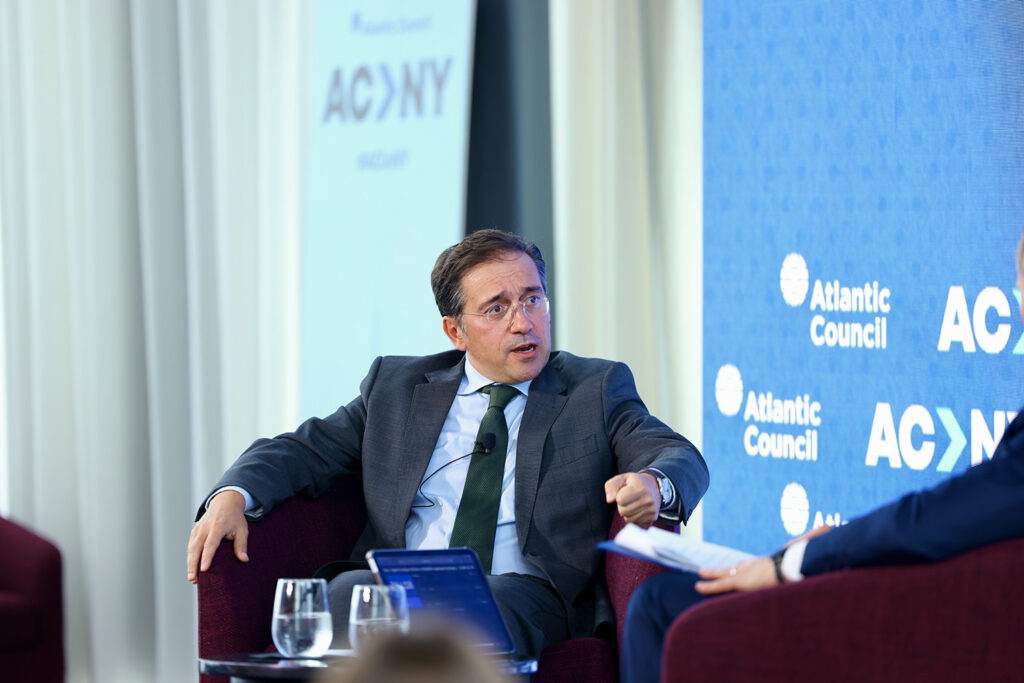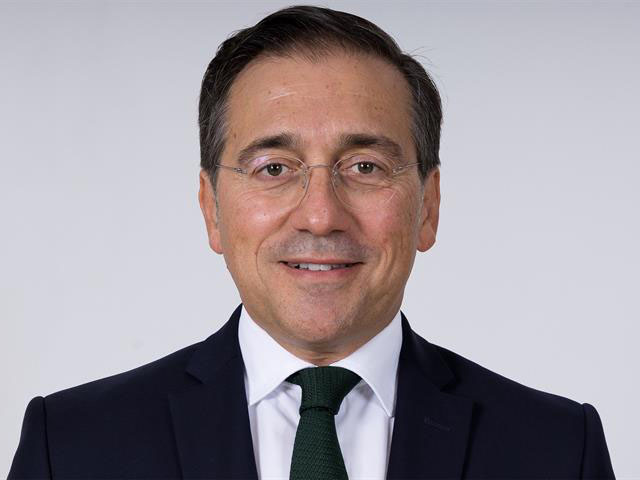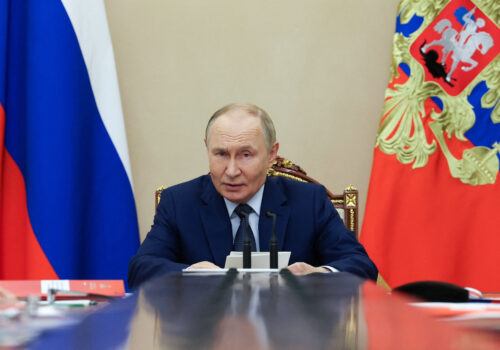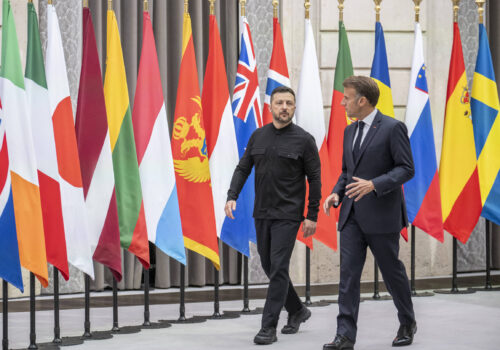Watch the event
There are “many more” countries “that believe in cooperation and multilateralism” than those that do not, so “it’s more important than ever to stand for those values and to speak up,” said José Manuel Albares Bueno, the Spanish minister for foreign affairs, European Union (EU), and cooperation on Tuesday.
Speaking at an Atlantic Council Front Page event in New York City on the sidelines of the United Nations (UN) General Assembly, Albares warned against the “real threat” that more powerful countries might be tempted to “think that they have a unilateral solution for global problems” or that “force must displace international law.”
Albares also discussed Spain’s role in transatlantic and European security, Madrid’s stance on the war in Gaza, and the country’s relations with China.
“Things that were common sense” to advocate at past UN general assemblies, he said, had now become “a little bit revolutionary to talk about,” such as peace initiatives and development cooperation. “But we have to do it.”
Below, find more highlights from the discussion with Albares, which was moderated by Matthew Kroenig, the vice president and senior director of the Atlantic Council’s Scowcroft Center for Strategy and Security.
‘Our biggest deployment ever’
- Albares said he believes that US President Donald Trump is “trying as hard as he can for peace” in Ukraine, but that he hasn’t seen “any hint” that Russian President Vladimir Putin wants peace or even a cease-fire.
- Any settlement in Ukraine, said Albares, must be “a lasting peace,” and not “a parenthesis between two wars.” He added that the peace agreement should be “adapted to the principles of the United Nations Charter” and ensure that Ukraine is “sovereign” and free to decide which international organizations it joins.
- Albares defended Spain’s position that it will not seek to reach the NATO defense spending target of 5 percent of gross domestic product by 2035, which was agreed to at this year’s NATO Summit in The Hague. He said he thought it was “the wrong approach to put the percentage first” and then decide how the money would be spent. “What’s really important is: What are the capability targets?”
- Albares noted the commitments Spain has made recently to transatlantic defense, including “our biggest deployment ever in the eastern flank of the Alliance with almost three thousand troops.” He also highlighted Spain’s role as NATO’s framework nation in Slovakia and Spain’s deployments in Romania, Lithuania, and Latvia, as well as its participation in this month’s Operation Eastern Sentry in response to the incursion of Russian drones into Poland.
‘Justice for the Palestinian people’
- Albares spoke of the need for an end to the war in Gaza, as “foodstuff is being halted at the border, and babies are dying because of induced famine. This is unacceptable from any point of view.”
- “The real solution for peace,” he said, “including the people of Israel, that have of course a right to security,” is a two-state solution that would lead to the creation of a “viable and realistic Palestinian state.” Spain first recognized a Palestinian state last year; more countries across the West have joined in recent weeks.
- A two-state solution, Albares said, would mean “justice for the Palestinian people. I don’t see why they should be the only people on Earth that are condemned to be eternally a people of refugees.”
- Regarding the governance of a future Palestinian state, Albares said that Palestinian Authority leaders were “our partners for peace. Hamas is not.” Hamas, he said, “is a terrorist organization that must be disarmed and disappear,” and the group “has no role to play whatsoever in a future Palestinian state.”
‘The Indo-Pacific’s centrality to security and prosperity’
- Spain is “aware of the Indo-Pacific’s centrality to security and prosperity,” said Albares. He highlighted his country’s contributions to joint security initiatives in the region, including the navy frigate Méndez Núñez, which joined the navies of the United Kingdom, Norway, and Canada in an Indo-Pacific deployment this year. “It’s worth noting that one-third of Australia’s navy has been built in Spain,” he added.
- Albares acknowledged that Spain has a “huge, unbalanced trade relation with China” and spoke of the need to “get to a level playing field” in Madrid’s economic relations with Beijing.
- The Spanish foreign minister emphasized the need for engagement with Beijing given China’s role as a permanent member of the UN Security Council and the scale of its population, economy, and military. “You need to have a dialogue,” he said. “You need to involve China.”
Daniel Hojnacki is an assistant editor on the editorial team at the Atlantic Council.
Watch the full event
Further reading
Tue, Sep 23, 2025
Dispatch from 2,200 feet over Gaza: What I learned from airdropping desperately needed food aid
New Atlanticist By Ahmed F. Alkhatib
The head of Realign For Palestine, an Atlantic Council project, joined a recent humanitarian flight over the Gaza Strip that delivered much-needed food to Palestinians.
Tue, Sep 23, 2025
Putin is escalating Russia’s hybrid war against Europe. Is Europe ready?
UkraineAlert By
Putin has clearly been encouraged by Trump’s efforts to downgrade America’s involvement in transatlantic security and feels emboldened to escalate his own hybrid war against Europe, writes Maksym Beznosiuk.
Tue, Sep 9, 2025
What is the Coalition of the Willing actually willing to do in Ukraine?
UkraineAlert By
European troops in Ukraine could serve as a meaningful element within a broader deterrence package, but Coalition of the Willing leaders should focus on making the Ukrainian military strong enough to deter the Kremlin, writes Mykola Bielieskov.
Image: José Manuel Albares Bueno, the Spanish minister for foreign affairs, European Union, and cooperation, speaks at an Atlantic Council Front Page event in New York City on September 24, 2025.




